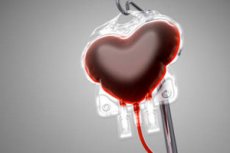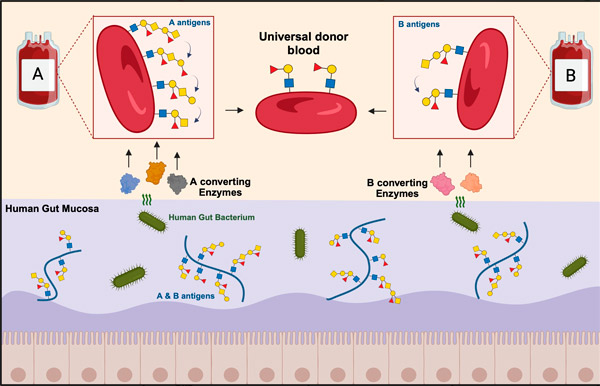New publications
Enzymes discovered to create universal donor blood
Last reviewed: 02.07.2025

All iLive content is medically reviewed or fact checked to ensure as much factual accuracy as possible.
We have strict sourcing guidelines and only link to reputable media sites, academic research institutions and, whenever possible, medically peer reviewed studies. Note that the numbers in parentheses ([1], [2], etc.) are clickable links to these studies.
If you feel that any of our content is inaccurate, out-of-date, or otherwise questionable, please select it and press Ctrl + Enter.

Researchers from DTU and Lund University have discovered enzymes that, when mixed with red blood cells, are able to remove specific sugars that make up the A and B antigens in the human ABO blood group system. The results were published in the journal Nature Microbiology.
"For the first time, the new enzyme cocktails not only remove the well-known A and B antigens, but also extended variants that were not previously recognized as problematic for transfusion safety. We are close to producing universal blood from type B donors, although work still needs to be done to convert the more complex type A," says Professor Maher Abou Hashem, head of the study at DTU and one of the leading scientists behind the discovery.
He notes that this discovery is the result of a combination of expertise between DTU researchers in enzymes from the human gut microbiota and Lund University researchers in the field of blood carbohydrate groups and transfusion medicine.
High demand for donor blood
Human red blood cells carry specific complex sugar structures (antigens) that define the four ABO blood groups: A, B, AB, and O. These antigens control compatibility between donors and recipients for safe blood transfusions and organ transplants. Donor blood is tested for disease markers and major blood groups and can then be refrigerated for up to 42 days.
The need for donor blood is high due to the increasing proportion of the elderly population and the increasing number of patients undergoing medical procedures that require significant amounts of blood. Successful conversion of blood types A or B to universal ABO donor blood can significantly reduce the logistical and financial costs associated with storing four different blood types.
In addition, the development of universal donor blood will increase the supply of donor blood by reducing the amount of blood approaching its expiration date.
The need to remove A and B antigens to create universal donor blood is explained by the fact that they can cause life-threatening immune reactions when transfused into inappropriate recipients.
The concept of using enzymes to create universal donor blood was proposed more than 40 years ago. Since then, enzymes have been discovered that are more effective at removing A and B antigens, but researchers still cannot explain or eliminate all immune reactions associated with blood, and so these enzymes are not yet used in clinical practice.
Enzymes from the intestines
Research teams from DTU and Lund University have taken a new route in finding enzymes that can remove both the A and B blood antigens and the sugars that block them. The research teams have discovered new enzyme mixtures from the gut bacterium Akkermansia muciniphila, which makes its living by breaking down the mucus that coats the surface of the intestine.
These enzymes were found to be extremely effective because the complex sugars on the surface of the intestinal mucosa are chemically similar to those found on the surface of blood cells.
"The peculiarity of the mucous membrane is that bacteria that can live on this material often have specially selected enzymes for breaking down the sugar structures of the mucous membrane, including the ABO blood group antigens. This hypothesis turned out to be correct," says Hashem.
The researchers in this study tested 24 enzymes, which they used to process hundreds of blood samples.

The ABO blood group antigens found on the surface of red blood cells are also present on the lining of the intestine. The researchers used a specialized gut bacterium and its ability to use these antigens as nutrients to develop two enzyme mixtures that convert red blood cells of types A and B into universal donor blood. Graphic: Matthias Jensen, postdoc at DTU. Source: Matthias Jensen, postdoc at DTU.
"Universal blood will create more efficient use of donor blood and will also help avoid errors in transfusing blood with incompatible ABO groups, which could otherwise lead to potentially fatal consequences for the recipient.
"When we can create universal ABO donor blood, we will simplify the logistics of transporting and using safe blood products while minimising blood loss," says Professor Martin L. Olsson, head of the study at Lund University.
The researchers from DTU and Lund University have applied for a patent on the new enzymes and their processing method, and expect further progress in this direction in their new joint project over the next three and a half years. If successful, the concept will need to be tested in controlled clinical trials before it can be considered for commercial production and clinical use.
